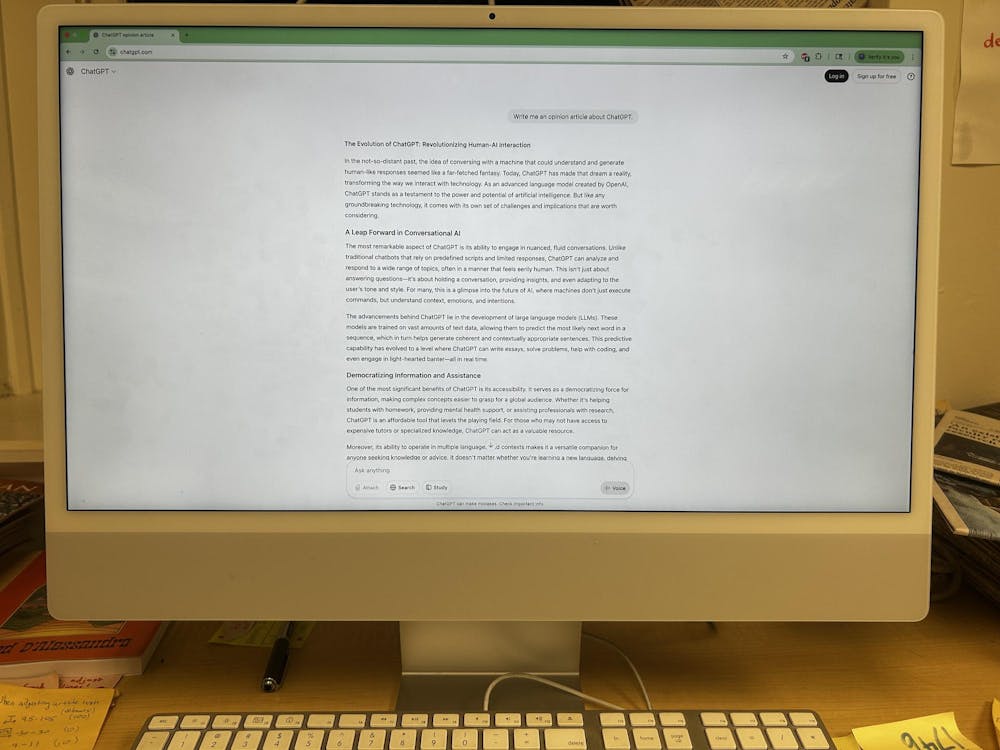AI is everywhere at Princeton. The pre-read for the Class of 2028 focused on the societal and technological impacts of AI. The University led efforts to establish a center for AI research in collaboration with state legislators. Around 80% of respondents to the Class of 2025 Senior Survey reported using generative AI on an assignment when allowed. And, as University President Christopher Eisgruber ’83 said himself, “Princeton’s strategic framework recognizes the promise and societal implications of artificial intelligence — as well as the University’s unique capacity to meet these challenges.”
Like many of my peers, I’m a ChatGPT user. Personally, I pay for the Plus version because it allows me to generate unlimited conceptual examples for complicated topics in my STEM classes, and provides unlimited data analysis inquiries. But not everyone is willing to shell out the $20 a month for an upgraded AI bot. With generative AI becoming an increasingly integral tool in work and research, Princeton should provide students free access to ChatGPT Plus.
Precedent for guaranteeing students access to more sophisticated generative AI models exists at our peer institutions. At Duke University, all undergraduate students have access to the latest ChatGPT models through a private institutional contract with OpenAI. They also have access to “DukeGPT,” an AI model developed specifically by the university for institutional use. Such steps eliminate financial barriers to the use of the latest models and equip their students with the fruits of the hard work of AI research and development. Furthermore, the conditions of the contract with OpenAI allow Duke to protect its students’ privacy by stipulating that no students’ data can be stored and used to train new models. Other universities have also implemented similar initiatives that provide broad access to ChatGPT and university-developed AI tools.
Currently, students who have the ability to pay for more sophisticated models like ChatGPT Plus are at an advantage. Duke’s model makes sense because it levels the playing field by eliminating the current cost barrier for access to the latest, most advanced and accurate models like GPT-5. These models are faster and are better at analyzing data; we shouldn’t deprive students of the chance to access the latest tools — which we are leading efforts in developing — because they cannot pay for them. Without equal access to advanced models of ChatGPT, students are not on a level playing field. Princeton rightfully bans outside tutoring because it provides an unfair advantage to students who have the means to afford it. This situation is not so different.
We must accept that students are using generative AI whether we like it or not, and that the best response is to level the playing field, ensuring that the cost of better models doesn’t entrench class-based disparities in learning outcomes. If the University acknowledges the near-universal usage of ChatGPT among students, it can become an equitable learning tool, better acquainting all of us with the potential for advanced AI to enhance our learning.
In a widely cited article in the New Yorker, Princeton history professor D. Graham Burnett described the surprising results of an assignment he developed in which students were encouraged to have a conversation with ChatGPT about the history of attention. His article reveals that ChatGPT has value across diverse academic disciplines: When implemented in engaging and sophisticated ways, ChatGPT is capable of much more than simply generating p-set answers or summarizing course readings. In fact, the very act of interrogating ChatGPT changes the way we think about machine and human learning, and that’s a process in which students should be included.
The University’s library system pays for a vast network of online resources. If we can fund access to basically every academic journal ever, we can certainly afford to pay for ChatGPT Plus. Given the centrality of research to the Princeton undergraduate experience, these tools should be available to the entire student body in ways that protect their data privacy and fuel the production of even higher-quality research.
Very few would deny that these tools do have potential for misuse. But paying for a more advanced ChatGPT model is unlikely to give rise to new bad habits: If a student is excited by getting access to ChatGPT Plus, they were probably already using ChatGPT anyway. So far, Princeton’s professors have done an admirable job at designing assessments and assignments to avoid generative AI abuse.

AI, whether generative or not, is the future: the 2024 Nobel Prize in Chemistry was awarded for the development of AlphaFold, an AI-powered model that predicts protein folding and structure. To be able to contribute meaningfully throughout our lives in whichever field we choose, Princeton students need the chance to amply experience AI and figure out how it can sharpen our abilities as learners. To do that, we all need the opportunity to engage with the most sophisticated models.
Jorge Reyes is an Opinion columnist for the ‘Prince.’ You can read his column here. He intends to major in Chemistry and is from Louisville (Loo-uh-vul), Ky. He can be reached at jr7982[at]princeton.edu.









